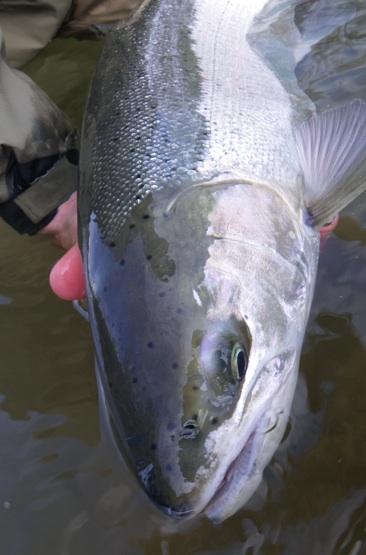1st Washington wild steelhead management zone established
 Thursday, February 9, 2012 at 12:04AM
Thursday, February 9, 2012 at 12:04AM  Wild Sol Duc Chrome
Wild Sol Duc Chrome
In a victory for wild steelhead advocates, Washington State has established it's first Wild Steelhead Management Area in the Sol Duc River. The WSMA is a direct result of the department's decision to end the Snider Creek hatchery program which was influenced by 400 public comments generated though the collective efforts of advocacy groups and media outlets, including this site. To those of you who took the time to submit a comment favoring ending the Snider Creek program, take pride in knowing that you helped make a difference for wild steelhead in Washington State.
Thanks to the Native Fish Society, Wild Steelhead Coalition, Osprey Steelhead News, John McMillan and Dick Burge who were on the leading edge of this effort.
NEWS RELEASE
Washington Department of Fish and Wildlife
February 8, 2012
Contact: Ron Warren, (360) 249-1201
Sol Duc wild steelhead management zone
established; Snider Creek program to end
OLYMPIA – The Washington Department of Fish and Wildlife (WDFW) has announced it will end a hatchery steelhead program at Snider Creek next year to establish a wild steelhead management zone in the Sol Duc River.
After next spring, no hatchery steelhead will be released into the Sol Duc River, which will be the first wild steelhead management zone formally established in the state under the department’s Statewide Steelhead Management Plan, said Ron Warren, regional fish program manager for WDFW. Snider Creek is a tributary to the Sol Duc River in Clallam County.
Wild management zones, also known as wild stock gene banks, are designed to preserve key populations of wild fish by minimizing interactions with hatchery-produced fish, said Warren. Research has shown that hatchery fish are often less genetically diverse and can impact wild stocks through interbreeding or competition for food or habitat.
WDFW is also looking to identify other streams that could be candidates for wild management zones, said Warren. That effort includes working with an advisory group to identify specific streams in the Puget Sound region.
“Establishing wild management zones is part of a broad effort aimed at modifying our hatchery programs to be compatible with conservation and recovery of naturally spawning salmon and steelhead populations,” Warren said. “Shifting hatchery steelhead production away from the Sol Duc River – where we have one of the largest wild steelhead populations in the state – is an important step in that effort.”
Changes designed to support naturally spawning salmon and steelhead populations are driven by plans and policies adopted by the Washington Fish and Wildlife Commission, such as the Statewide Steelhead Management Plan and the Hatchery and Fishery Reform policy, Warren said.
The Statewide Steelhead Management Plan is available on the department’s website at http://wdfw.wa.gov/conservation/fisheries/steelhead/, while the commission’s hatchery and fishery reform policy is available at http://wdfw.wa.gov/commission/policies/c3619.html.
While the hatchery program will no longer take place at Snider Creek, WDFW is working with stakeholders to re-establish a similar effort in the Bogachiel or Calawah rivers, where the department already releases hatchery steelhead, said Warren.
The program will end next spring, when 25,000 winter steelhead smolts are released into the Sol Duc River, Warren said. Last year, WDFW also discontinued its summer steelhead program on the Sol Duc River, after releasing 20,000 smolts.
Before making that decision, WDFW conducted three public meetings and reviewed about 400 public comments on the future of the Snider Creek program.
While fewer and fewer hatchery steelhead will be returning to the Sol Duc River in the coming years, anglers will continue to have opportunities to fish for salmon and other game fish, as well as retain one wild steelhead per license year on the river, said Warren.
The Snider Creek program was created in 1986 as a joint project with the Olympic Peninsula Guides’ Association to increase fishing opportunities for steelhead on the Sol Duc River. The program is unlike most other hatchery efforts in that it produces offspring from wild steelhead rather than hatchery fish.







Reader Comments (5)
I was pretty excited about this until I read the part of retaining 1 wild fish per year. Big failure.
Something is wrong with the "share article" link. I don't wan't to share "Moldy Chum", I just want to share the article itself on Facebook. Please fix it.
Great idea, but wtf's with using bonking wild fish as a way of appeasing anglers? fuck that...send them to the hatchery brat streams
boo. wild fish taste better anyways.
Step in the right direction. No kill would be better.